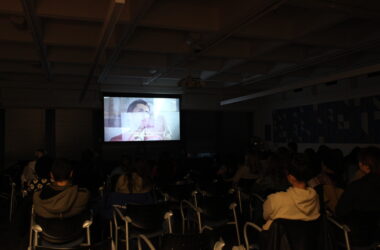On Oct. 26, a crowd packed into La Petite Librairie Drawn & Quarterly for the launch of two world-class comic books: Julie Doucet’s Dirty Plotte and Jason Lutes’ Berlin.
Beyond its title as the Mile End’s hippest bookstore, Drawn & Quarterly is one of North America’s most influential publishing houses for comic books and graphic novels. Doucet and Lutes are two of Drawn & Quarterly’s earliest authors, and the size and enthusiasm of the audience at the launch was evidence of the success of their collaboration.
A native Montrealer, Doucet was the first cartoonist Drawn & Quarterly ever published; her first comic was released 28 years ago this month. While she has long been retired from cartooning to pursue different artistic mediums, such as silk-screen prints, the publication of the retrospective collection Dirty Plotte: The Complete Julie Doucet is a celebration of both Doucet’s work and her influence.
“It all goes back to Julie,” Chris Oliveros, Drawn & Quarterly’s founder said. “She set the tone for everything at Drawn & Quarterly.”
The Dirty Plotte series, published throughout the ‘90s, was edgy, feminist, and ahead of its time. In an interview at the launch with feminist scholar Martine Delvaux, whose essay “My Secret Julie Doucet” is included in the newly-published collection, Doucet described the joy of re-reading her earliest works.
“It was complete freedom,” Doucet said. “It was so fresh and so energetic.”
When Doucet first began publishing, she was one of the first women to break into the comic book world’s boys’ club. Her frank and feminist depictions of graphic sexual content only magnified the division between Doucet and her male peers.
“I guess it surprised them,” Doucet said, laughing.
Her male counterparts may have been surprised at the time, but Doucet paved the way for the next generations of female cartoonists.
Jason Lutes’ Berlin strikes a stark contrast in tone and content to Dirty Plotte: It is a 22-chapter historical epic retelling the story of the Weimar Republic.
In an engaging presentation, Lutes traced his own personal history, beginning with a childhood spent hunched over comics in the corner of a magazine shop in Missoula, Montana. His early obsession with superheroes and Westerns was augmented by a love for Tintin, encouraged by his father, a French professor at the University of Montana. After attending the Rhode Island School of Design to study ‘real art,’ specifically drawing, he came to realize that comic books, rather than a childhood triviality, were an equally valid vehicle for expression. Comic books could be relevant to eager children and thoughtful adults alike.
“Comics [are] an art form for anyone, no matter what kind of story you want to tell,” said Lutes.
After graduating in 1991, Lutes got a job creating a serialized comic strip for the Seattle-based indie magazine The Stranger. Recalling that Tintin had also begun as a serialized strip in Belgium, Lutes turned the job into his own “self-education in comics.” This work was eventually collected into his first book, Jar of Fools.
Berlin, Lutes’ most ambitious endeavour, was born from a chance encounter with a collection of Bertolt Brecht’s paintings. Envisioning a historical work, Lutes plunged into the history of the Weimar Republic.
Starting when he was just 26, Lutes planned a six-hundred-page work and estimated that he would finish it by the time he turned forty. As it happened, he was fifty by the time he completed Berlin’s 22nd and final chapter this year.
“I missed some deadlines,” Lutes quipped.
The result of nearly twenty-five years of work, Berlin is a comic magnum opus on an unprecedented scale, tracing the lives of more than a dozen characters during the rise of Nazism. It is one of the fullest expressions yet of the narrative and artistic potential latent in the comic book form.
The same can be said for Doucet’s Dirty Plotte, which, in its collected, newly-republished entirety, rivals Berlin in length. Thursday’s book launch was a celebration of the growth of the comic book as an art form, and of two of its greatest and most artful exemplars. It was also a celebration of the seminal role that Drawn & Quarterly has played in this growth of the form, the results of which are already echoing far beyond the island of Montreal.








